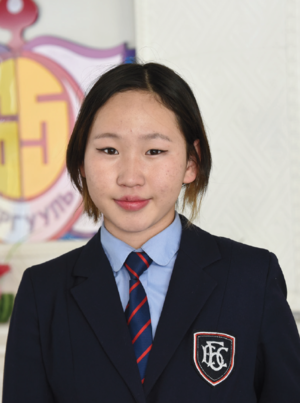Knowledge fuels change - Support energypedia!
For over 10 years, energypedia has been connecting energy experts around the world — helping them share knowledge, learn from each other, and accelerate the global energy transition.
Today, we ask for your support to keep this platform free and accessible to all.
Even a small contribution makes a big difference! If just 10–20% of our 60,000+ monthly visitors donated the equivalent of a cup of coffee — €5 — Energypedia would be fully funded for a whole year.
Is the knowledge you’ve gained through Energypedia this year worth €5 or more?
Your donation keeps the platform running, helps us create new knowledge products, and contributes directly to achieving SDG 7.
Thank you for your support, your donation, big or small, truly matters!
Difference between revisions of "Beneficiary Story - Student O. Oyuntugs"
***** (***** | *****) m Tag: 2017 source edit |
***** (***** | *****) m Tag: 2017 source edit |
||
| Line 2: | Line 2: | ||
= Background = | = Background = | ||
| − | O.Oyuntugs is a 10th grade student in a school situated in the Songinokhairkhan district of Ulaanbaatar, one of the poorest quarters of the Mongolian capital. She lives in one of the coldest capital cities in the world, with average temperatures of around -20°C in winter. To defy those adversities, the Mongolian population uses coal to heat the traditional yurts, called gers; unfortunately, this leads to considerable air pollution, and health risks. The GIZ project “Energy Efficient Building Refurbishment in Mongolia” tries to tackle this problem. | + | [[File:EEP - O. Oyuntugs.PNG|thumb]]O.Oyuntugs is a 10th grade student in a school situated in the Songinokhairkhan district of Ulaanbaatar, one of the poorest quarters of the Mongolian capital. She lives in one of the coldest capital cities in the world, with average temperatures of around -20°C in winter. To defy those adversities, the Mongolian population uses coal to heat the traditional yurts, called gers; unfortunately, this leads to considerable air pollution, and health risks. The GIZ project “Energy Efficient Building Refurbishment in Mongolia” tries to tackle this problem. |
= The Project = | = The Project = | ||
Revision as of 09:37, 15 June 2022
Background
O.Oyuntugs is a 10th grade student in a school situated in the Songinokhairkhan district of Ulaanbaatar, one of the poorest quarters of the Mongolian capital. She lives in one of the coldest capital cities in the world, with average temperatures of around -20°C in winter. To defy those adversities, the Mongolian population uses coal to heat the traditional yurts, called gers; unfortunately, this leads to considerable air pollution, and health risks. The GIZ project “Energy Efficient Building Refurbishment in Mongolia” tries to tackle this problem.The Project
The project comprises the construction of energy efficient buildings, and the improvement of the framework conditions for the energy-saving construction sector in Mongolia. Furthermore, the project team advised the city administration in the drafting of a local energy efficiency plan and trained companies of the construction and finance sector to consider the subject of energy efficiency in their activities. The project also renovated 22 public buildings in the two poorest quarters of Ulaanbaatar, to reduce the all-important energy and heating losses.
One of those buildings is Oyuntugs’ school. The project team values the participation of all those concerned. Oyuntugs was one of the members of the monitoring team that comprised of teachers, staff, students, and parents who were involved in the renovation process. The monitoring team received the necessary training to supervise the refurbishment, and was able to learn about energy efficiency. Given this, Oyuntugs was empowered to take responsibility in the renovation process, and to express her opinion which was valued by the adults.
Before the Renovation
Previously, the cold in the school was so intense that high-quality learning was restricted. Oyuntugs describes the effects of the building refurbishment on the education situation as follows:
“Before, we often sat in class in thick clothes and jackets and didn’t feel like writing anything when our hands were cold. So we put our hands in our sleeves. It was clear what attendance was like under such conditions. However, thanks to extensive renovation and insulation work, children’s attendance and extracurricular activities have increased significantly, so they spend more time in school.”
A teacher adds: “It is obvious that no one can learn and develop well in an unpleasant, cold environment. Students are not emotionally calm, and everything is ineffective when they have frequent colds”.
Impacts of the Renovation
In this way, the building refurbishment was able to create an improved environment in which students fall sick less often and are able to participate better in class. The money saved by the improved energy efficiency can be invested in the development of Mongolia. The experience in the monitoring team motivated Oyuntugs to study engineering to help improve energy efficiency in her country. She considers energy efficiency as a subject that everyone should care about:
“I want to become a qualified engineer, who uses her mind and energy, to help Mongolia to become a highly developed country that makes good use of energy. I want everyone to feel the benefits of energy efficiency.”
For more information about the project please contact: XYZ





















